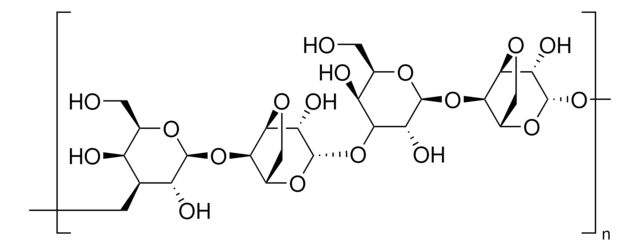T6066
Trizma® base
BioPerformance Certified, meets EP, USP testing specifications, suitable for cell culture, ≥99.9% (titration)
Synonym(s):
2-Amino-2-(hydroxymethyl)-1,3-propanediol, THAM, Tris base, Tris(hydroxymethyl)aminomethane, Trometamol
About This Item
Recommended Products
grade
BioPerformance Certified
Quality Level
Agency
USP/NF
meets EP testing specifications
meets USP testing specifications
description
aminopeptidase substrate
Assay
≥99.9% (titration)
form
crystalline powder
storage condition
dry at room temperature
technique(s)
DNA extraction: suitable
cell culture | mammalian: suitable
protein purification: suitable
impurities
DNase, RNase, protease, none detected
Endotoxin and Total Count Aerobic, Yeast, plus Mold, tested
≤0.2% water (Karl Fischer)
loss
≤0.5% (loss on drying, 110 °C)
color
white
pH
10.0-11.5
useful pH range
7-9
pKa (25 °C)
8.1
bp
219-220 °C/10 mmHg (lit.)
mp
167-172 °C (lit.)
solubility
water: soluble (666 mg/ml, yielding a clear colorless solution)
absorption
≤0.05 at 260 at 1 M
≤0.05 at 290 at 40%
≤0.06 at 280 at 1 M
suitability
suitable for chromatography
suitable for immunoprecipitation
suitable for molecular biology
application(s)
clinical research
clinical testing
diagnostic assay manufacturing
SMILES string
NC(CO)(CO)CO
InChI
1S/C4H11NO3/c5-4(1-6,2-7)3-8/h6-8H,1-3,5H2
InChI key
LENZDBCJOHFCAS-UHFFFAOYSA-N
Looking for similar products? Visit Product Comparison Guide
General description
This compound can be employed independently as a buffer or as part of mixed buffer formulations, including Tris-EDTA (TE) buffer, Tris-acetate-EDTA (TAE) buffer, Tris-borate-EDTA (TBE) buffer, among others. Notably, Tris base is pure, essentially stable, and relatively non-hygroscopic.
In laboratory settings, Tris base proves indispensable for preparing buffers compatible with biological fluids, serving as a standard pH solution, and facilitating various procedures such as lactate dehydrogenase assays, in situ hybridization, and protein extraction from cells. Its versatility extends to applications in cell culture, biochemistry, and molecular biology labs, where it aids in studies related to cell membrane permeability and buffer preparation.
Application
- As a component in the culture of human embryonic stem (hES) cells on human and mouse feeder cells
- As a component of pre-hybridization buffer in in situ hybridization
- To suspend dried protein before SDS-PAGE protein characterization
- As a component of lysis buffer to wash and lyse cells before immunoprecipitation
- In the extraction and enrichment of membrane proteins for separation by two-dimensional polyacrylamide gel electrophoresis
- In studies of double stranded complexes of peptide nucleic acids (PNA) and their complementary DNA sequences, by use of anion exchange HPLC
- In capillary electrochromatography and UV analysis of tocopherols and tocotrienols
- as a component of Tris/base solution in a sulforhodamine B (SRB) assay
Features and Benefits
- Suitable for Cell culture, Biochemical and Molecular Biology Research
- Tested to confirm low levels of heavy metal contamination, ensuring suitability for various applications
- Effective Buffering from pH 7-9 (25 °C) with a pKa of 8.1 (25 °C)
- Tested for the presence of Anionic and Cationic traces
- Tested for DNase, RNase, and protease
Packaging
Each kit contains 3 x 100G samples, each sample from a uniquely manufactured lot.
Other Notes
For precise applications, use a carefully calibrated pH meter with a glass/calomel combination electrode.
Legal Information
also commonly purchased with this product
comparable product
Storage Class Code
11 - Combustible Solids
WGK
WGK 1
Flash Point(F)
Not applicable
Flash Point(C)
Not applicable
Personal Protective Equipment
Certificates of Analysis (COA)
Search for Certificates of Analysis (COA) by entering the products Lot/Batch Number. Lot and Batch Numbers can be found on a product’s label following the words ‘Lot’ or ‘Batch’.
Already Own This Product?
Find documentation for the products that you have recently purchased in the Document Library.
Customers Also Viewed
Articles
The Comet Assay, also called single cell gel electrophoresis (SCGE), is a sensitive and rapid technique for quantifying and analyzing DNA damage in individual cells.
Protocols
Creating Transgenic Mice using CRISPR-Cas9 Genome Editing
Our team of scientists has experience in all areas of research including Life Science, Material Science, Chemical Synthesis, Chromatography, Analytical and many others.
Contact Technical Service





